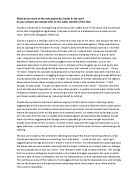What do we learn of the role played by Crooks in the text?
In your answer you should refer to the wider context of the text.
Crooks is introduced in the beginning of the text as the ‘stable buck’ of the ranch, and one feature of him that is highlighted significantly is the way in which he is addressed by the others on the ranch, often with derogatory references.
Crooks is placed in a setting in which he is the only black man of the ranch, and because the text is set in a time where racism was prominent, he is often discriminated against. Candy describes the boss as ‘[giving] him hell when he’s mad’, despite Candy himself describing Crooks as a ‘nice fella’ with a ‘crooked back’. The description of Crooks with his ‘crooked back’ introduces Crooks with the role of someone who is able to rise above his troubles, being described as ‘a proud, aloof man’, despite the fact that his life, like the others on the ranch is dominated by loneliness, and therefore Crooks can be seen as the struggle of man during harsh conditions, such as the economic depression in which the text is set in. Evidence of his struggles can be seen by his own view of ranch life, describing himself as someone who ‘ain’t wanted in the bunk house… ‘Cause I’m black’. Despite the constant racial prejudice surrounding him, Crooks represents mankind as a whole in which everyone is struggling during the depression, and despite going through difficulties Crooks perseveres and stands up for his rights. One example of Crooks standing up for his rights is shown when Crooks shows enough pride to demand Curley’s wife to leave his bunk: ‘“I had enough, he said coldly. “You got no rights comin’ in a coloured man’s room’”. However this short burst of pride and independence, like many other people’s, is quickly reversed when Curley’s wife threatens to falsely accuse him of committing a crime which would ultimately see Crooks lynched, and Crooks quickly withdraws by ‘reducing himself to nothing’.









